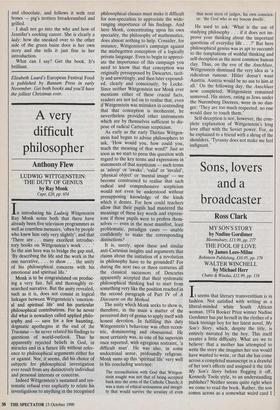A very difficult philosopher
Anthony Flew
LUDWIG WITTGENSTEIN: THE DUTY OF GENIUS by Ray Monk Cape, £20, pp. 654 In introducing his Ludwig Wittgenstein Ray Monk notes both that there have already been five television programmes as well as countless memoirs, 'often by people who knew him only very slightly'; and that `There are . . . many excellent introduc- tory books on Wittgenstein's work . . . .' So the aim here was to bridge the gap and, `By describing the life and the work in the one narrative, . . . to show . . . the unity of his philosophical concerns with his emotional and spiritual life.'
Monk is to be congratulated on produc- ing a very fair, full and thoroughly re- searched narrative. But the unity revealed, such as it is, does not consist in logical linkages between Wittgenstein's 'emotion- al and spiritual life' and his particular philosophical contributions. For he never did what is nowadays called applied philo- sophy and — save for a few haunting, dogmatic apothegms at the end of the Tractatus — he never related his findings to questions of world-outlook. Thus he apparently rejected beliefs in God, in miracles and in a future life without refer- ence to philosophical arguments either for or against. Nor, it seems, did his choice of subjects for philosophical investigation ever result from any distinctively individual and personal interests or concerns.
Indeed Wittgenstein's sustained and sys- tematic refusal ever explicitly to relate his investigations to anything in the recognised philosophical classics must make it difficult for non-specialists to appreciate the wide- ranging importance of his findings. And here Monk, concentrating upon his own speciality, the philosophy of mathematics, does almost nothing to help. Consider, for instance, Wittgenstein's campaign against the misbegotten conception of a logically private language. Even to begin to appreci- ate the importance of this campaign you need to know that that conception was originally presupposed by Descartes, tacit- ly and unwittingly, and then later expound- ed, clearly and consciously, by Locke. Since neither Wittgenstein nor Monk ever mentions either of these crucial facts, readers are not led on to realise that, even if Wittgenstein was mistaken in contending that that conception is incoherent, he nevertheless provided other instruments which are by themselves sufficient to dis- pose of radical Cartesian scepticism.
As early as the early Thirties Wittgen- stein had begun to advise philosophers to ask, 'How would you, how could you, teach the meaning of that word?' Just so soon as we start to press this question with regard to the key terms and expressions in statements of that scepticism — such terms as 'asleep' or 'awake', 'valid' or 'invalid', `physical object' or 'mental image' — we become constrained to realise that such radical and comprehensive scepticism would not even be understood without presupposing knowledge of the kinds which it denies. For how could teachers allow that their pupils had mastered the meanings of these key words and express- ions if those pupils were to profess them- selves — even in the most manifest, least problematic, paradigm cases — unable confidently to make the corresponding distinctions?
It is, surely, upon these and similar anti-Cartesian insights and arguments that claims about the initiation of a revolution in philosophy have to be grounded? For during the next two or three centuries all the classical successors of Descartes apparently accepted that their systematic philosophical thinking had to start from something very like the position reached in the second paragraph of Part IV of A Discourse on the Method.
The unity which Monk seeks to show is, therefore, in the main a matter of the perceived duty of genius to apply itself with honest devotion. In fulfilling this duty Wittgenstein's behaviour was often eccen- tric, domineering and obsessional. He most certainly was, as one of his superiors once reported, with egregious restraint, 'a difficult man'. He was also, in some undoctrinal sense, profoundly religious. Monk sums up this 'spiritual life' very well in his concluding sentence:
The reconciliation with God that Wittgen- stein sought was not that of being accepted back into the arms of the Catholic Church; it was a state of ethical seriousness and integri- ty that would survive the scrutiny of even that most stern of judges, his own conscien- ce: 'the God who in my bosom dwells'.
He used to ask: 'What is the use of studying philosophy . . . if it does not im- prove your thinking about the important questions of everyday life . . .?' But here philosophical genius was as apt to succumb to the temptations of wishful thinking and self-deception as the most common human clay. Thus, on the eve of the Anschluss, Wittgenstein dismissed the very idea as 'a ridiculous rumour. Hitler doesn't want Austria. Austria would be no use to him at all.' On the following day, the Anschluss now completed, Wittgenstein remained unmoved. His sisters, rating as Jews under the Nuremberg Decrees, were in no dan- ger: 'They are too much respected, no one would dare to touch them.'
Self-deception is not, however, the com- plete explanation of Wittgenstein's long love affair with the Soviet power. For, as he explained to a friend with a shrug of the shoulders, 'Tyranny does not make me feel indignant.'


























































 Previous page
Previous page